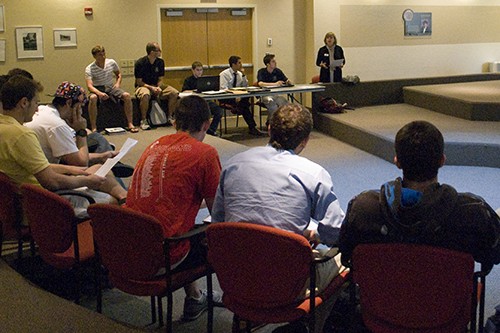The Interfraternity Council created a partnership with Emerge Center Against Domestic Abuse in response to the high incidences of sexual violence on college campuses.
Sexual violence is experienced at a “”disproportionately high rate”” among college students, with an estimated one in four college women becoming a victim of sexual assault by the time she graduates, according to the United States Department of Justice.
Steven Otero, the president of the Interfraternity Council, said he wants fraternity members to recognize this problem and do whatever they can to help reduce the incidents.
“”Through our service at this organization, our men can be more educated about sexual assault and domestic abuse,”” he said.
He added that money raised by the council would go to the center.
Kimberly A. Thompson, the vice president of philanthropy at Emerge, said she was “”honored”” that the council chose to give funds to the center. She explained in a meeting with the council members that the members of the council likely know someone who has been abused or witnessed abuse as a child.
“”I believe you know about the brothers who could harm or take advantage of women,”” she said. “”You need to recognize those men and try and help them.””
Thompson explained that the types of activities the men would be participating in at the center would be “”mostly manual clean up”” in addition to painting for the child-care center, gardening, fundraising and potentially helping the center with its business module, depending on credentials.
The partnership, which was unanimously adopted by the members, states that the council will: educate current and new members on issues of sexual assault through Emerge and Campus Health Service, encourage members to plan social functions and themes that condone an atmosphere representing positive roles of men and women within the community, preserve and protect the rights and safety of all individuals in all social settings, and promptly and honestly address incidents of sexual misconduct.
Emerge has two centers in Southern Arizona and serves about 2,400 women and children every year, according to Thompson. They also have a community child-care center that serves up to 80 children, a 24-hour bilingual hotline and an advocacy program to “”get women protection.””
“”Often, the women have no money, sometimes no documents, and escape with nothing but the clothes on their back,”” Thompson said.
For more information about the Emerge Center Against Domestic Abuse, please visit emergecenter.org.








